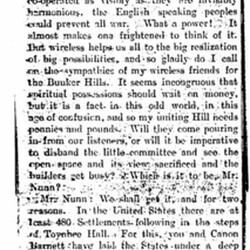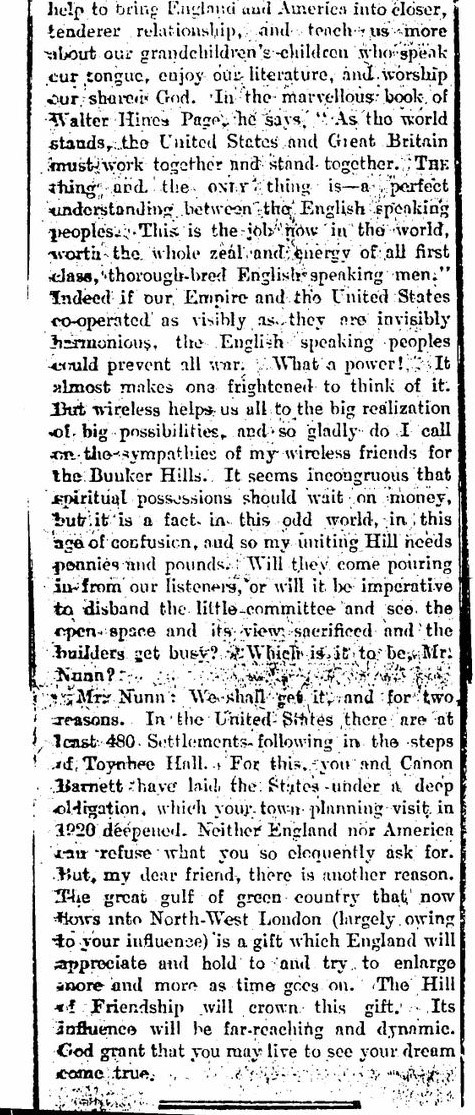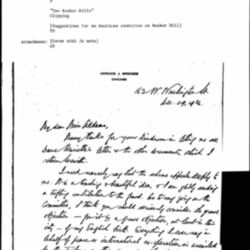As briefly stated in the “Express” last week there was a Broadcast Talk on October 5th between Dame Henrietta, D.B.E., and Councillor T. Hancock Nunn on “Two Bunker Hills.” The following is a full report of the “Talk” :--
Dame Henrietta Barnett: I must begin tonight’s Talk with thanks for the number of beautiful letters I have received about my reading of religious poetry a few weeks ago, and an apology because I have not replied personally to them all. May I be forgiven please. All the more readily because I am going to give you the pleasure of introducing to you a much valued friend, Mr. Hancock Nunn. When you are introduced, don't you wish the person were labelled, not only with his name, but with a short description of what he has done? I often do, so I will tell you that Mr. Nunn was the first man to sleep in Toynbee Hall, Whitechapel, in 1884, on the floor, in the big drawing room; that he devotedly served some of the saddest and poorest of East London’s people for nine years and then married and moved to Hampstead, where he is the soul and brain of the Hampstead Council of Social Welfare, and the founder, with his friends there, of the Social Service Movement which has spread throughout England. That is why he is talking to you [tonight] because social service includes the health, happiness, holiness of people, and, therefore, the need of open spaces.
Mr. T. H. Nunn: My Dear Dame Henrietta, now you have bored our listeners by all that about me, let us get to the subject which has brought us face to face with this magic small box and to the sympathetic ears of many thousands of people. Of course, I know of your -- our scheme for the Hampstead Bunker Hill, but I would rather you should lead off by describing your plan.
Dame Henrietta: If I were fifty years younger I should reply, “Right O! Old Bean,” but as we are both grey-headed I answer with old fashioned decorum. “Certainly, Mr. Nunn, and where would you like me to begin?”
Mr. Nunn: Surely, in America, where there is the Bunker’s Hill that has made the name known all over the world. It is, I believe crowned with an obelisk. That obelisk marks the site of the first pitched battle between the States and England in the war that secured the independence of the States.
Dame Henrietta: Yes! and it is just because of that obelisk and that tablet that my committee and I want to buy the Bunker Hill near Hampstead Hill and keep it as a Hill of Friendship and remembrance -- in grateful remembrance -- of the fact that America joined us and the Allies in the Great War, and when our boys fought and died together for the cause of right and freedom.
Mr. Nunn: You mean that the two Bunker’s Hills will stand for the growth of good feeling that has taken place in the 150 years. It is a fine thought, strong, and also tender. [page 2]
Dame Henrietta: Ah! But I have not half described it yet. I delight in the Americans, their efficiency, their resolution to arrive at the foundation of things. Their system of making “surveys” before they take action, their recognition of ideals -- and, and, and a few more virtues which would sound like flattery if I said them all. I have been twice to America, once with my husband Canon Barnett, thirty-five years ago, and once on a lecturing tour in 1921, and each time I have returned with a determination to do my little bit to help England to understand and appreciate the American mind, character, and national ideals better than they do.
Mr Nunn: I quite agree. It wants doing. But I want you to show more clearly where Bunker’s Hill comes in. Is it not when bought, to be kept as an open space?
Dame Henrietta: Yes! But an open space does not necessarily mean an empty space, and both from Scandinavia and America we get the example of using public parks for purposes of mental as well as physical recreation. That is a nice word when it is divided. Re-Creation, and must include the mind and spirit. In America one constantly sees fine words pregnant with thought from their great writers, engraved on stone, and in the Stockholm and Copenhagen parks there are objects either of beauty or interest which awaken thoughts on past history, or suggest subjects requiring study. Would it not be nice to have more of that sort of thing in our open spaces?
Mr. Nunn: True, and they might touch the imagination of the crowds which come in their hundred of thousands to Hampstead Heath on Bank Holidays. Indeed the Hampstead Council of Social Welfare provide a variety of pastimes, sports and dances, and run a tent for lost children, on these occasions. You, yourself, and the Canon have often grieved over the purposeless wandering and obvious boredom of those Bank Holiday crowds.
Dame Henrietta: And do the people take advantage of these opportunities for intelligent amusement?
Mr. Nunn: Yes indeed! Hundreds of boys and girls take part and thousands of spectators enjoy watching them. Your Bunker Hill project will also do much to interest the people, and your thought stimulants will be always on the spot and available. Will you tell your listeners what your committee proposes?
Dame Henrietta: We have had the advantage of the aid of Mr. Williams-Ellis, whose plan provides for a low slightly curved wall on which would be inscribed the names of the American and English regiments who fought together. In front of it would be a low railing, for the English boys’ love of mischief has to be recognized, and by the railing should grow flowers. This would be on the summit of the Hill --
Mr. Nunn: From which the view is superb you were going to say. Yes it is indeed, and makes a glorious landscape for the sunsets which, -- but I interrupted you as you were speaking of the other plans for the spiritual enrichment of the Hill.
Dame Henrietta: I think one of the most regrettable ignorances which is the result of education negligences is the people’s indifference to geography. “Somewhere across the sea” often is all they know, so on the Hill I should like to put a large stone globe on which would be carved the names of the American States and the chief towns, so that the English people could learn more of the great country which sent its men to aid the Allies, and say to each other, “Look here, [page 3] this is Boston, Chicago, or New York, where that fine fellow I told you of came from, and now he lies out you.” The large stone globe would also show England, with her small isles and great Empire, and this would help all who see it to [realize] her position in the world of nations as well as that of continental countries and of the multitudinous Eastern races.
Mr. Nunn: That is an interesting suggestion, but so is the Bunker Hill committee’s proposal to have metal tables on which could be engraved the names of the battlefields and countries where the American and British fought shoulder to shoulder. I understand that by the side of the names there would be arrows pointing in the direction of the battle sites. Thus parents who have lost their dear ones could stand by the table and see the arrows pointing to France, Flanders, Serbia, Mesopotamia, where those they loved have died.
Dame Henrietta: Yes, “Lest we forget” is needed even eight years after Armistice Day, and will be still more wanted as time goes on.
Mr. Nunn: How is your committee getting on? Does it see its way to the £15,000 that is needed?
Dame Henrietta: We hope that the British people will subscribe half of the needed money in grateful memory of the soldiers from the United States, and that the American people will subscribe the other half of the needed money in recognition of the sacrifices English people made. But who gives which part does not matter. What we want is that every one who cares should give. The other day Mr. Gerald Balfour told me a delightful story. A small girl was frightened of going to bed alone. “But,” said her mother, “you know dear you need not be afraid, you always have your guardian angel hovering over you.” “Yes! I know Mummy,” said the child, “but I hope it won’t settle on me.” That is how lots of people feel about their purses. They think the plan quite splendid if someone else would pay for it. The guardian angel would appear intrusive if it settled on them. But my listeners are not children frightened of the dark. They will give and give, and write me dear letters to accompany their sacrifices.
Mr. Nunn: Good, Dame Henrietta, and I hope that the result of this talk will be that everyone who listens will help to buy a spadeful of the English Bunker Hill -- for one plot of land is rarely able to meet three needs at the same time, and therefore entitled to appeal to three sorts of purses or [check] books.
Dame Henrietta: You mean that if the Hill is bought, it will increase the Health and give to everyone who will climb it some far-reaching views -- (and big expanses of the country are very influential on city-bred character). Then it will give an opportunity of making an easy experiment in scattering interesting information for those taking recreation, and lastly, but oh! of infinite importance, it will [page 4] help to bring England and America into closer, tenderer relationship, and teach us more about our grandchildren’s children who speak our tongue, enjoy our literature, and worship our shared God. In the [marvelous] book of Walter Hines Page, he says, “As the world stands, the United States and Great Britain must work together and stand together. THE thing and the ONLY thing is a perfect understanding between the English speaking peoples. This is the job now in the world, worth the whole zeal and energy of all first class, thorough-bred English speaking men.” Indeed if our Empire and the United States [cooperated] as visibly as they are invisibly harmonious, the English speaking people could prevent all war. What a power! It almost makes one frightened to think of it. But wireless helps us all to the big realization of big possibilities, and so gladly do I call on the sympathies of my wireless friends for the Bunker Hills. It seems incongruous that spiritual possessions should wait on money, but it is a fact in this odd world, in this age of confusion, and so my uniting Hill needs pennies and pounds. Will they come pouring in from our listeners, or will it be imperative to disband the little committee and see the open space and its view sacrificed and the builders get busy? Which is it to be Mr. Nunn?
Mr. Nunn: We shall get it, and for two reasons. In the United States there are at least 480 Settlements following in the steps of Toynbee Hall. For this, you and Canon Barnett have laid the States under a deep obligation, which your town planning visit in 1920 deepened. Neither England nor America can refuse what you so eloquently ask for. But, my dear friend, there is another reason. The great gulf of green country that is now flows into North-West London (largely owing to your influence) is a gift which England will appreciate and hold to and try to enlarge more and more as time goes on. Its influence will be far-reaching and dynamic. God grant that you may live to see your dream come true.






















Comments